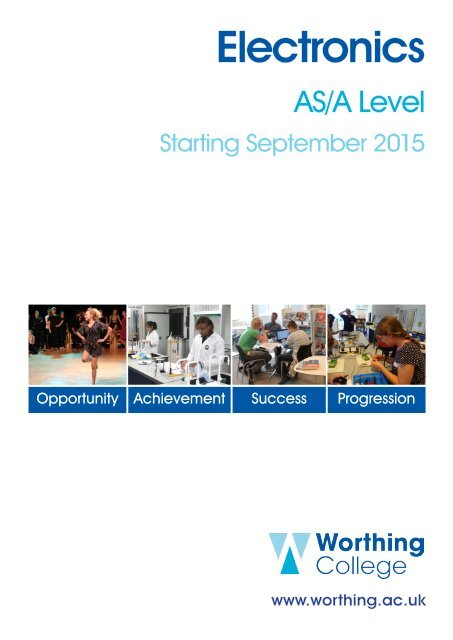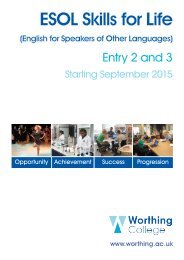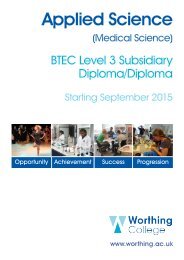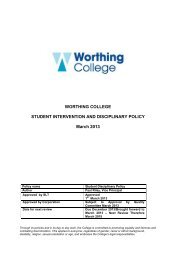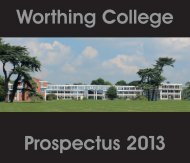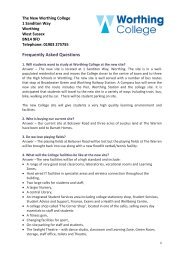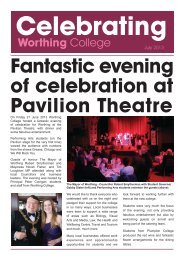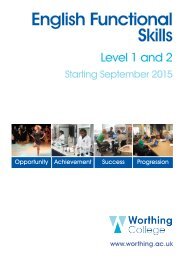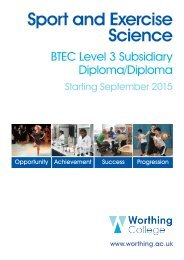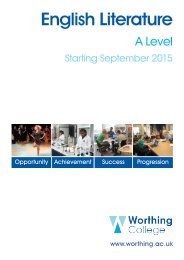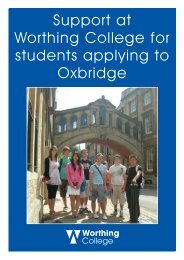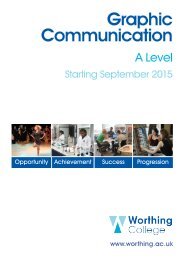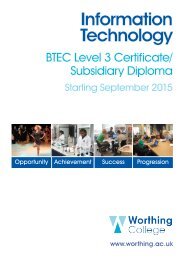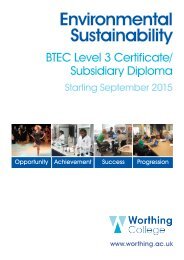Electronics AS/A Level - Worthing College
Electronics AS/A Level - Worthing College
Electronics AS/A Level - Worthing College
You also want an ePaper? Increase the reach of your titles
YUMPU automatically turns print PDFs into web optimized ePapers that Google loves.
<strong>Electronics</strong><br />
<strong>AS</strong>/A <strong>Level</strong><br />
Starting September 2015<br />
Opportunity Achievement Success Progression<br />
www.worthing.ac.uk
When do I start studying for<br />
this qualification?<br />
September 2015.<br />
For how long will I study?<br />
One year for <strong>AS</strong>; a further year to<br />
complete the full A <strong>Level</strong>.<br />
What is this course about?<br />
Would you enjoy finding out how a<br />
drinks machine is programmed to give<br />
you a perfect cup of coffee? Are you<br />
keen to learn how the modern world<br />
communicates and controls the vast<br />
amount of data that it generates?<br />
Are you interested in building and<br />
testing basic electronic circuits from<br />
fundamental principles? Ever thought<br />
about how an amplifier works? If<br />
you answer is ‘yes’ to most of these<br />
questions then Electonics <strong>AS</strong>/A <strong>Level</strong><br />
could be for you.<br />
What topics will I study?<br />
<strong>AS</strong> <strong>Level</strong> Units:<br />
1. Digital Systems: logic gates, system<br />
design, sequential logic systems,<br />
amplifiers.<br />
2. Circuits & Components: circuit<br />
principles, components, timing circuits,<br />
semiconductor diodes, signal sources,<br />
switching circuits.<br />
3. Control System Project:<br />
using software to programme a<br />
microcontroller.<br />
A <strong>Level</strong> Units<br />
4. Communication Systems: Filters,<br />
modulation techniques, radio, digital<br />
communication systems.<br />
5. System Applications: Counting,<br />
microcontroller systems, power,<br />
instruments, high power switching<br />
systems, audio.<br />
6. Major Design Project: Practical<br />
project planning, development, testing<br />
and reporting.<br />
How will my work be<br />
assessed?<br />
At <strong>AS</strong> <strong>Level</strong>: Units 1 and 2 exams in<br />
the summer (70% of marks). Unit 3 is<br />
coursework assessment of your project<br />
to programme a microcontroller (30%<br />
of marks).<br />
At A <strong>Level</strong>: Units 4 and 5 exams in<br />
the summer. Unit 6 is coursework<br />
assessment of your planning, design,<br />
building testing and reporting in your<br />
major project.<br />
What skills and interests do<br />
I need beforehand to be a<br />
successful applicant for this<br />
course?<br />
The specification builds on the<br />
knowledge, understanding and skills<br />
developed in GCSE Science and<br />
Maths. You will need to be able to<br />
use Mathematical skills (computation,<br />
algebra and graphs) and IT skills during<br />
the course and be interested in their<br />
application in the modern world.<br />
What skills and good practice<br />
will I need to develop during<br />
the course to succeed?<br />
Develop an interest in electronics and<br />
pursue this in further study in your<br />
own time, use appropriate methods to<br />
answer questions and solve problems,<br />
analyse, interpret and communicate<br />
evidence and ideas.<br />
Are there any specific entry<br />
requirements?<br />
You need a minimum of five GCSEs<br />
at A*- C grade including a grade B in<br />
GCSE Maths and two grade Bs in<br />
GCSE science. You will also have to<br />
study Physics A <strong>Level</strong> or Maths <strong>AS</strong>/A<br />
<strong>Level</strong>.
What are the lessons like?<br />
Most of the theoretical work in<br />
electronics can be tested practically<br />
and lessons usually contain a mixture<br />
of theory and group practicals.<br />
The project work in the first year is<br />
mainly ICT based. In the second year<br />
the major project is designed and<br />
developed on an individual basis with<br />
one-to-one advice and guidance given<br />
when needed.<br />
1:1 support is available to all students.<br />
What students say about this<br />
course?<br />
“It goes really well with Maths and<br />
Physics.”<br />
“I really enjoy the practical work.”<br />
“It helps with Physics at A <strong>Level</strong>.”<br />
Is there a similar qualification<br />
to this one? If so how do I<br />
choose between them?<br />
<strong>Electronics</strong> has a close relationship to<br />
Maths and Physics but most people<br />
take a combination of these subjects.<br />
What do people do with A <strong>Level</strong><br />
<strong>Electronics</strong>?<br />
It is an excellent preparation for<br />
most physical science first degrees,<br />
particularly those in engineering<br />
and research disciplines. Electronic<br />
Engineering at university can lead to<br />
the international job market with many<br />
vacancies throughout Europe. Good<br />
electronics engineers are scarce and<br />
starting salaries often reflect this.<br />
As there is a programming element to<br />
<strong>Electronics</strong> A <strong>Level</strong> it is a very useful<br />
entry qualification for a degree in<br />
computing.<br />
For those not intending to take<br />
the subject to a higher level, an<br />
appreciation of the fundamental<br />
concepts of electronics is useful in<br />
careers such as the armed forces,<br />
aviation, computing and many<br />
technological industries.<br />
The Applied Physics BTEC course<br />
offers an excellent alternative for<br />
students who benefit from ongoing<br />
assessment in preference to exams.<br />
Are there any other<br />
qualifications which combine<br />
particularly well with this one?<br />
See above. Some people combine<br />
<strong>Electronics</strong> with subjects other than<br />
Maths, Sciences and IT to broaden<br />
the range of skills they can offer in the<br />
future. For example a combination with<br />
Music could support later progression<br />
into Music Technology.
Correct at issue date. Please see www.worthing.ac.uk for updates.<br />
Apply now on-line at www.worthing.ac.uk<br />
T: 01903 275755<br />
E: info@worthing.ac.uk<br />
Issue 09.2014


